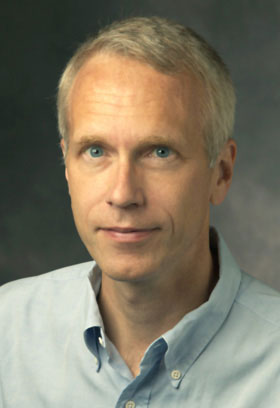
The word "sharing" came up a lot as Robert J. Lefkowitz and others talked about the work he did to earn the 2012 Nobel Prize in Chemistry, which he shares with one of his former students, Brian Kobilka of Stanford.
"The science is almost a byproduct" of his mentoring, Lefkowitz said shortly before a hurriedly organized press conference on Wednesday, the day his prize was announced.
In addition to making discoveries that form the basis of a third to a half of all prescription drugs and devising tools that have made drug discovery dramatically faster and more efficient, Lefkowitz has fathered "a big extended family" of scientists. In his nearly 40 years at Duke, he has mentored 220 graduate students and post-doctoral fellows -- four generations of scientists -- most of them focusing on the G protein-coupled receptors (GCPR) that have been his life's work.
Often, he said, when he congratulates some young scientist for giving a great GCPR talk at a conference, they'll reply "but of course, my mentor was one of your students."
Lefkowitz's secretary tried to count it up a few years ago: about 50 of his former students and trainees are named professors, deans, provosts and even university presidents. "That doesn't include all the folks who ended up as vice presidents or executive vice presidents in pharma," he added.
His legacy, he said, is both the people and the science. "They're inextricable."
The nice thing about G protein-coupled receptors is they are found throughout physiology, Lefkowitz noted. "I've had fellows in the lab from every discipline of medicine except infectious disease. I don't know why that is."

And as he talked about how and why he won the prize, Lefkowitz was typically selfless and generous in his praise for Kobilka, whose work in the last 10 years is "what put us over the line," he said. "In the last 10 years, he has independently made totally different contributions."
At the start of the press conference, Dr. Nancy Andrews, dean of the Duke School of Medicine, said, "There are three ways that a medical scientist can be great -- by making discoveries that immediately transform patient care, by making scientific contributions that stand the test of time and by mentoring the next generation of scientists. Bob Lefkowitz has accomplished all three."
"He is one of the world's natural teachers, and I mean by that he's one of the world's natural sharers," said Duke President Richard Brodhead. "You made two contributions: One was your discovery, and the second one was your discovery of the powers of mentorship."
Former and current graduate students agree that what makes Lefkowitz such a great mentor is his compassion for his lab members, who he said he considers part of his extended family. "He cares about people," said Wei Chen, an assistant professor of medicine at Duke and former post-doc in Lefkowitz's lab. "He's open-minded, creative and imaginative, and he really encourages everyone he works with to think outside of the box."
"What's great about Bob is that he is always willing to listen," said Mark Fereshteh, a former post-doc in the Lefkowitz lab who is now a senior research scientist at Bristol-Myers Squibb in Princeton, N.J. "He's a people person. He interacts with many different people on many different levels. He has people from all walks and all fields in his office, and he is always able to engage with them intellectually."
And he loves data. "He will always spend a lot of time looking at data," said Fereshteh, who like many members of the vast Lefkowitz family still checks in with "Bob" regularly.
"Not a week goes by that I don't have contact with several of my former students, asking about everything from 'what should the title of this paper be' to marital counseling," Lefkowitz said.